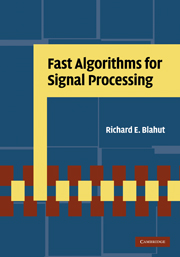Book contents
- Frontmatter
- Contents
- Preface
- Acknowledgments
- 1 Introduction
- 2 Introduction to abstract algebra
- 3 Fast algorithms for the discrete Fourier transform
- 4 Fast algorithms based on doubling strategies
- 5 Fast algorithms for short convolutions
- 6 Architecture of filters and transforms
- 7 Fast algorithms for solving Toeplitz systems
- 8 Fast algorithms for trellis search
- 9 Numbers and fields
- 10 Computation in finite fields and rings
- 11 Fast algorithms and multidimensional convolutions
- 12 Fast algorithms and multidimensional transforms
- A A collection of cyclic convolution algorithms
- B A collection of Winograd small FFT algorithms
- Bibliography
- Index
9 - Numbers and fields
Published online by Cambridge University Press: 03 May 2011
- Frontmatter
- Contents
- Preface
- Acknowledgments
- 1 Introduction
- 2 Introduction to abstract algebra
- 3 Fast algorithms for the discrete Fourier transform
- 4 Fast algorithms based on doubling strategies
- 5 Fast algorithms for short convolutions
- 6 Architecture of filters and transforms
- 7 Fast algorithms for solving Toeplitz systems
- 8 Fast algorithms for trellis search
- 9 Numbers and fields
- 10 Computation in finite fields and rings
- 11 Fast algorithms and multidimensional convolutions
- 12 Fast algorithms and multidimensional transforms
- A A collection of cyclic convolution algorithms
- B A collection of Winograd small FFT algorithms
- Bibliography
- Index
Summary
Number theory has already been seen in earlier chapters of this book. It was used in the design of fast Fourier transform algorithms. We did make use of some ideas that only now will be proved. This chapter, which is a mathematical interlude, will develop the basic facts of number theory – some that were used earlier in the book and some that we may need later.
We also return to the study of fields to develop the topic of an extension field more fully. The structure of algebraic fields will be important to the construction of number theory transforms in Chapter 10 and also to the construction of some multidimensional convolution algorithms in Chapter 11 and for some multidimensional Fourier transform algorithms in Chapter 12.
Elementary number theory
Within the integer quotient ring Zq, some of the elements may be coprime to q, and, unless q is a prime, others will divide q. It is important to us to know how many elements there are of each type.
Definition 9.1.1 (Euler)The totient function, denoted ϕ(q), where q is an integer larger than one, is the number of nonzero elements in Zq that are coprime to q. For q equal to one, ϕ(q) = 1.
When q is a prime p, then all the nonzero elements of Zq are coprime to p, and so ϕ(p) = p – 1 whenever p is a prime.
Information
- Type
- Chapter
- Information
- Fast Algorithms for Signal Processing , pp. 286 - 310Publisher: Cambridge University PressPrint publication year: 2010
Accessibility standard: Unknown
Why this information is here
This section outlines the accessibility features of this content - including support for screen readers, full keyboard navigation and high-contrast display options. This may not be relevant for you.Accessibility Information
- 1
- Cited by
